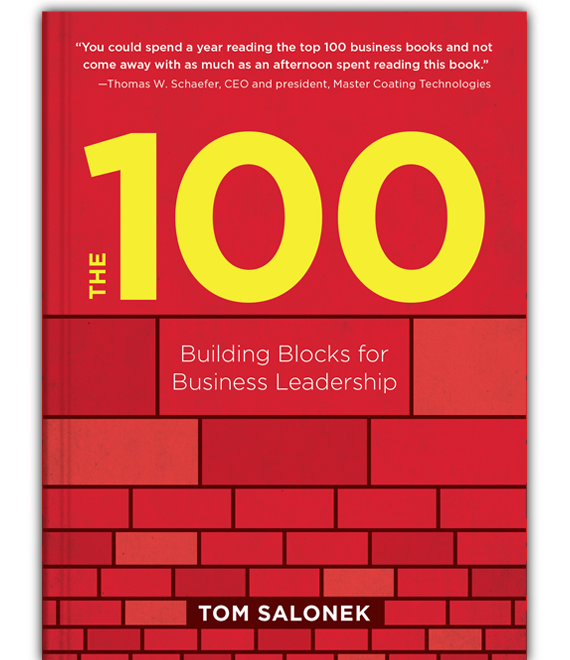Thoughts from The 100: Defining Personal Values, Setting Goal
 “Thoughts from The 100” is a series of posts with thoughts, examples, and additional insights from my book The 100.
“Thoughts from The 100” is a series of posts with thoughts, examples, and additional insights from my book The 100.
Living one’s best life is not a casual activity. It takes thought, preparation, planning and commitment. I believe when we identify our deepest motivation—our values—and align our behaviors accordingly; we are more likely to achieve goals that lead to a full life, fully lived.
To imagine my own deepest values, I imagined what people would say about me at my own funeral. What mattered most? Leaving a legacy of care for others: my family and friends, my employees and even people I don’t know. I realized that caring for others means spending time with them and listening to them.
This little exercise inspired me to ask employees how Intertech could best support them in living their best lives. Not surprisingly, healthy work-life balance was high on their lists. This spurred our decision to create three-month sabbaticals for employees with seven years of service. We’ve also begun providing financial support for new employees who wish to set up a home office.
This year, Intertech was named a top workplace for employee flexibility by Fortune magazine. While we’ve won dozens of awards for being a great place to work, the award for flexibility was especially meaningful because it goes to the heart of our core values.
Digging deep enough to identify your core values is worth the effort. Values bring meaning and clarity to our lives. They also serve as guiding principles when establishing goals and making decisions. As Roy Disney once noted, “It’s not hard to make decisions when you know what your values are.”
Turning Values into Reality
Values are worthless if they’re not connected to behavior. Yet how do you decide what form your values should take in the world? Try envisioning your future.
Seriously, close your eyes and try to picture yourself in 10 years. Get specific. What do things look like? Think about the rhythm of your day and how you will look, act and feel at work and in all other areas of your life.
Far from a “touchy- feely” exercise, the effectiveness of visualization has been proven by solid research and is used by athletes and others to achieve desired results. Once you’ve gotten a handle on your desired results, you need to formulate goals. Think of goals as the roadmap and values as the destination.
I’m a believer in SMART goals, that is goals that are:
- Specific
- Measureable
- Achievable
- Realistic
- Time Driven
Some potential categories for life goals include your primary relationship, friends, kids, professional and business, fitness, philanthropy, creative pursuits, finances, spirituality, travel, and learning.
For goals, set SMART long term goals. Next, break them down into smaller chunks. Aim high and include dates. Never leave a goal setting session without taking some action… this could be as simple as a making a phone call or doing a some online research.
I also advocate writing your goals down and posting them where you can see them on a daily basis. If you’re afraid you might slip into old habits that work against your goal, share your goals with others.
For more about goals, I highly recommend Think and Grow Rich by Napolean Hill and The Magic of Thinking Big by David Schwartz.
For my employees, and me, achieving a healthy work-life balance is a top goal. Next time I’ll share some specific strategies for doing just that!

 My thanks to Web.com Small Business Forum for naming The 100 Building Blocks of Business Leadership to their list of “
My thanks to Web.com Small Business Forum for naming The 100 Building Blocks of Business Leadership to their list of “ Finding the proper balance between work and family was a bit of a struggle at first for Summit Hill resident Tom Salonek, founder and CEO of Intertech, a 25-year-old technology consulting and training firm.
Finding the proper balance between work and family was a bit of a struggle at first for Summit Hill resident Tom Salonek, founder and CEO of Intertech, a 25-year-old technology consulting and training firm.